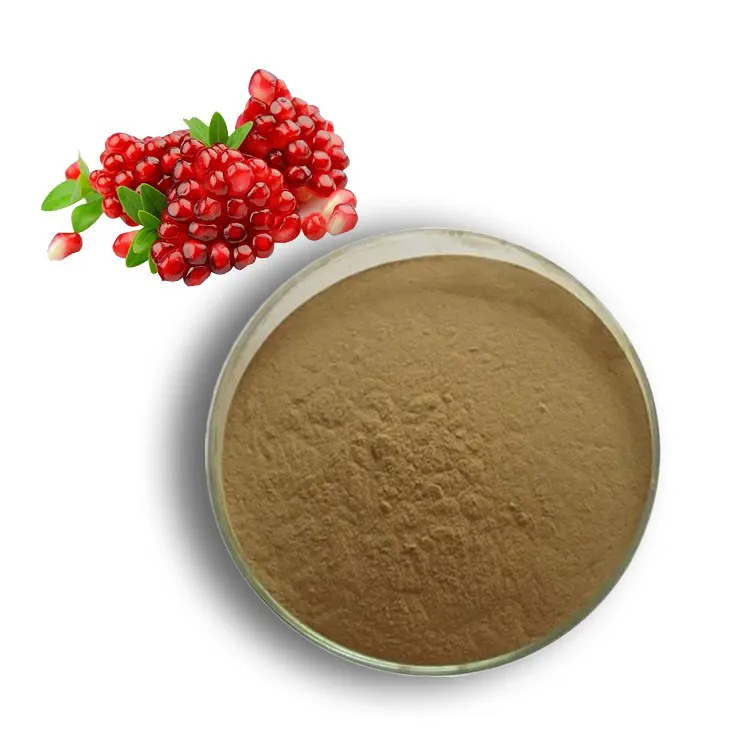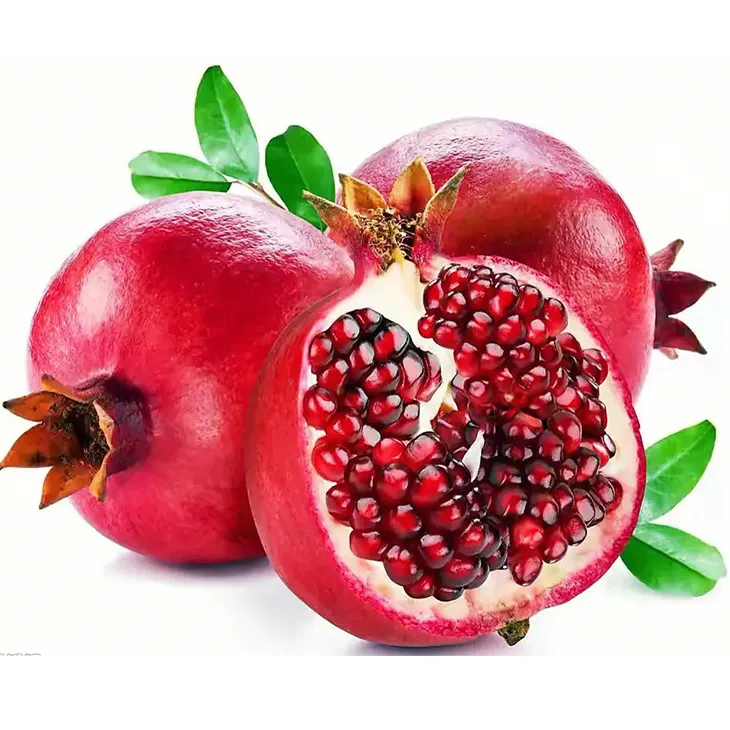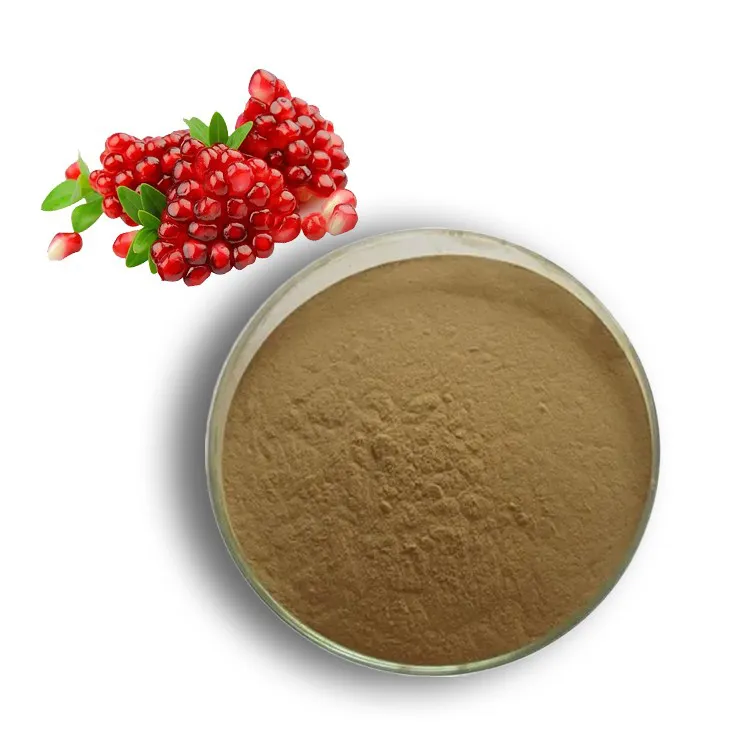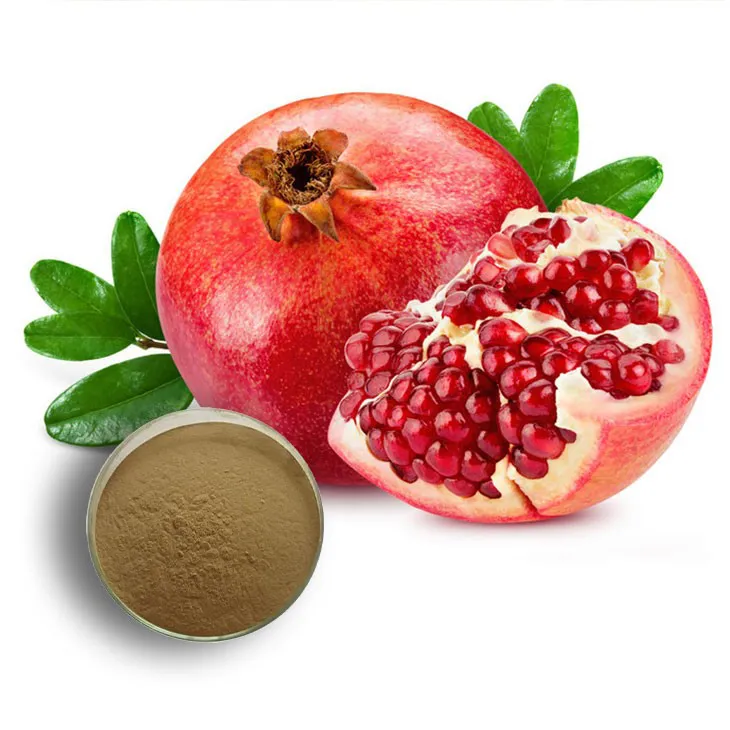- 0086-571-85302990
- sales@greenskybio.com
Components of pomegranate extract in fertilizers and feeds.
2024-12-01

1. Introduction
In recent years, the exploration of natural products for use in fertilizers and feeds has been on the rise. Pomegranate Extract has emerged as a promising candidate in this regard. Pomegranate, a fruit known for its rich nutritional profile, contains a variety of components that can have beneficial effects when incorporated into fertilizers and feeds. This article aims to provide a comprehensive understanding of the components within Pomegranate Extract that are relevant to these applications.

2. Pomegranate Extract: A Brief Overview
Pomegranate extract is obtained from different parts of the pomegranate tree, including the fruit, peel, and seeds. It is a complex mixture of various compounds, which are the result of the plant's secondary metabolism. These compounds can be broadly classified into several categories, such as phenolic compounds, organic acids, vitamins, and minerals. Each of these components plays a unique role in the potential applications of pomegranate extract in fertilizers and feeds.

3. Components of Pomegranate Extract for Fertilizer Applications
3.1 Phenolic Compounds
Phenolic compounds are among the most abundant and important components in pomegranate extract. These include flavonoids, tannins, and phenolic acids. In the context of fertilizers, phenolic compounds can have several positive impacts on soil health.
Flavonoids, for example, can act as signaling molecules in the soil. They can interact with soil microorganisms, influencing their behavior and activity. This interaction can lead to an improvement in soil structure. Flavonoids can also enhance the solubility of certain nutrients in the soil, making them more available to plants.
Tannins present in pomegranate extract have the ability to bind with heavy metals in the soil. This is significant as it can prevent the uptake of toxic heavy metals by plants. Moreover, tannins can also contribute to the regulation of soil pH, creating a more favorable environment for plant growth.
Phenolic acids, on the other hand, can stimulate root growth. They can act as natural root growth promoters, increasing the root surface area. This, in turn, allows plants to absorb more nutrients and water from the soil, promoting overall plant development.
3.2 Organic Acids
Pomegranate extract contains a variety of organic acids, such as citric acid, malic acid, and tartaric acid. These organic acids play important roles in soil fertilization.
Citric acid can chelate with essential nutrients like iron, zinc, and manganese in the soil. Chelation helps in preventing the precipitation of these nutrients, keeping them in a soluble form that can be easily absorbed by plants. This is especially important in alkaline soils where the availability of these micronutrients is often limited.
Malic acid can enhance soil microbial activity. Microbes in the soil are crucial for nutrient cycling and decomposition of organic matter. By promoting microbial activity, malic acid can indirectly improve soil fertility. It can also act as a source of carbon for soil microorganisms, further stimulating their growth and activity.
Tartaric acid can contribute to soil acidification in a controlled manner. In some soils, a slight decrease in pH can increase the availability of phosphorus and other nutrients. Tartaric acid can help in achieving this optimal soil pH range for better plant nutrient uptake.
3.3 Minerals
Pomegranate extract contains essential minerals that can be beneficial for plants. Potassium, for instance, is an important macronutrient present in pomegranate. Potassium is involved in various physiological processes in plants, such as photosynthesis, water regulation, and disease resistance.
Calcium is also found in pomegranate extract. Calcium is essential for cell wall formation in plants. It provides structural stability to plant cells and is also involved in signal transduction within the plant.
Magnesium, another mineral in pomegranate, is a central component of the chlorophyll molecule. Adequate magnesium levels are necessary for efficient photosynthesis in plants. Incorporating pomegranate extract into fertilizers can supply these essential minerals to the soil, thereby enhancing plant growth.

4. Components of Pomegranate Extract for Feed Applications
4.1 Vitamins
Pomegranate extract is a source of vitamins that can be beneficial for animals when included in feeds. Vitamin C, for example, is present in pomegranate. Vitamin C is an antioxidant that can help in reducing oxidative stress in animals. Oxidative stress can lead to various health problems in animals, including reduced immune function and decreased productivity.
Vitamin K is also found in pomegranate extract. Vitamin K is important for blood clotting in animals. Adequate levels of vitamin K in the diet can prevent excessive bleeding and ensure normal blood coagulation.
In addition, pomegranate extract may contain other vitamins in smaller amounts, such as B - vitamins. B - vitamins are involved in energy metabolism in animals. Their presence in the feed can help in improving the efficiency of energy utilization in animals, leading to better growth and performance.
4.2 Phenolic Compounds (again)
Just as in the case of fertilizers, phenolic compounds in pomegranate extract also have important roles in feed applications. These compounds can act as natural antioxidants in animal diets.
Flavonoids can scavenge free radicals in the animal's body. Free radicals are highly reactive molecules that can cause damage to cells and tissues. By reducing the levels of free radicals, flavonoids can protect the animal's organs from oxidative damage, improving overall health.
Tannins in pomegranate extract can have an impact on the digestibility of feed. They can bind with proteins in the feed, reducing the rate of protein digestion in the stomach. However, this can also have a positive effect in some cases. For ruminant animals, tannins can slow down the rate of protein degradation in the rumen, allowing for a more efficient use of dietary protein.
4.3 Organic Acids (again)
The organic acids present in pomegranate extract can also play a role in animal feeds. Citric acid, for example, can improve the palatability of the feed. Animals are more likely to consume feed that has a pleasant taste, and citric acid can enhance the flavor of the feed.
Malic acid can have an impact on the gut environment of animals. It can help in maintaining the proper pH in the gut, which is important for the growth and activity of beneficial gut bacteria. A healthy gut microbiota is crucial for the overall health and performance of animals.
Tartaric acid can also contribute to the acid - base balance in the animal's body. It can help in buffering the pH in the digestive tract, ensuring a stable internal environment for proper digestion and nutrient absorption.

5. Interactions and Synergistic Effects
The components of pomegranate extract do not act in isolation in either fertilizers or feeds. There are often interactions and synergistic effects between different components.
In fertilizers, for example, the phenolic compounds and organic acids can work together to improve soil structure. The phenolic compounds can interact with soil particles, while the organic acids can help in dissolving and mobilizing nutrients. This combined action can lead to a more fertile soil environment for plant growth.
In feeds, the vitamins and phenolic compounds can have a synergistic effect on animal health. The vitamins can support the normal physiological functions of the animal, while the phenolic compounds can protect the animal from oxidative stress. Together, they can enhance the animal's immune function and overall performance.
6. Challenges and Future Directions
While the potential of pomegranate extract in fertilizers and feeds is promising, there are also some challenges that need to be addressed.
One of the challenges in using pomegranate extract in fertilizers is standardization. The composition of pomegranate extract can vary depending on the source, extraction method, and processing conditions. This variation can lead to inconsistent results in soil fertilization. Future research should focus on developing standardized extraction and formulation methods to ensure reliable performance.
In the case of feed applications, the optimal dosage of pomegranate extract needs to be determined. Too much or too little of the extract can have different effects on animal performance. Additionally, the long - term effects of pomegranate extract on animal health and productivity need to be further studied.
Another area for future research is the exploration of new components in pomegranate extract. There may be other bioactive compounds in pomegranate that have not yet been fully explored for their potential in fertilizers and feeds.
7. Conclusion
Pomegranate extract contains a rich array of components that have potential applications in fertilizers and feeds. The phenolic compounds, organic acids, vitamins, and minerals in pomegranate extract can each contribute to better plant development in fertilizers and enhanced animal performance in feeds. Understanding the roles of these components and their interactions is crucial for maximizing the benefits of pomegranate extract in these applications. Despite the challenges, the future of pomegranate extract in fertilizers and feeds looks promising, with further research expected to unlock its full potential.
FAQ:
What are the main components of pomegranate extract?
Pomegranate extract contains various components. It is rich in phenolic compounds such as punicalagins and ellagic acid. It also has vitamins like vitamin C, and minerals to some extent. Additionally, it may contain flavonoids which contribute to its bioactive properties.
How can pomegranate extract modify soil structure in fertilizers?
The bioactive compounds in pomegranate extract can interact with soil particles. For example, phenolic compounds may bind to soil colloids, improving soil aggregation. This can lead to better soil porosity, allowing for better water infiltration and air circulation, which are crucial for plant root development.
What benefits does pomegranate extract bring to animal performance in feeds?
In feeds, pomegranate extract can act as an antioxidant. It helps to reduce oxidative stress in animals. Also, its bioactive components may improve digestion by influencing gut microbiota. This can lead to better nutrient absorption and ultimately enhance growth, reproduction, and overall health of animals.
Are there any potential drawbacks of using pomegranate extract in fertilizers and feeds?
One potential drawback in fertilizers could be over - stimulation of certain soil microbes, which might disrupt the soil microbial balance if not properly regulated. In feeds, the cost of incorporating pomegranate extract could be a factor. Also, if not used in appropriate amounts, it may cause unwanted effects on animal health, such as digestive disturbances.
How is pomegranate extract prepared for use in fertilizers and feeds?
For use in fertilizers, pomegranate extract can be obtained through extraction processes such as solvent extraction. The extract is then usually formulated with other components to make it suitable for application to the soil. In feeds, it is often purified and standardized to ensure consistent quality. It can be added to the feed either directly or as part of a premix.
Related literature
- The Composition and Potential Applications of Pomegranate Extract in Agriculture"
- "Bioactive Compounds in Pomegranate Extract: Implications for Animal Nutrition"
- "Pomegranate Extract - Mediated Soil Improvement in Sustainable Farming"
- ▶ Hesperidin
- ▶ citrus bioflavonoids
- ▶ plant extract
- ▶ lycopene
- ▶ Diosmin
- ▶ Grape seed extract
- ▶ Sea buckthorn Juice Powder
- ▶ Beetroot powder
- ▶ Hops Extract
- ▶ Artichoke Extract
- ▶ Reishi mushroom extract
- ▶ Astaxanthin
- ▶ Green Tea Extract
- ▶ Curcumin Extract
- ▶ Horse Chestnut Extract
- ▶ Other Problems
- ▶ Boswellia Serrata Extract
- ▶ Resveratrol Extract
- ▶ Marigold Extract
- ▶ Grape Leaf Extract
- ▶ blog3
- ▶ blog4
-
The best lemon juice powder in nature.
2024-12-01
-
Organic Vitamin K2 Powder Suppliers
2024-12-01
-
Bulk purchase of L - tyrosine.
2024-12-01
-
Vitamin K2 Manufacturers
2024-12-01
-
100% Pure Natural Rutin.
2024-12-01
-
Chinese Citrus Bioflavonoid Suppliers.
2024-12-01
-
Eyebright Extract
2024-12-01
-
Green coffee bean Extract
2024-12-01
-
Purple Sweet Potato Extract
2024-12-01
-
Beetroot Powder
2024-12-01
-
Lycopene
2024-12-01
-
Giant Knotweed Extract
2024-12-01
-
Beetroot juice Powder
2024-12-01
-
Green Tea Extract
2024-12-01
-
Hawthorn Extract
2024-12-01
-
Polygonum Cuspidatum Extract
2024-12-01





















